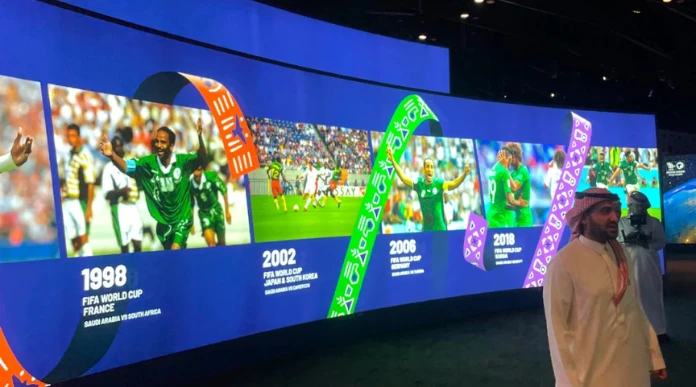The FIFA World Cup is a celebration that is much more than a sporting event; it consolidates people together, preaching inclusivity, unity, and diversity. Saudi Arabia having been granted the award to host the FIFA World Cup 2034 has ignited waves of criticism, with one of the main aspects of this criticism being gender segregation. Women’s participation in the workforce is hindered by both legal constraints and cultural norms. Recent reports indicate that women account for only around 21% of the workforce, facing substantial barriers to entering many sectors beyond education and healthcare. While the Kingdom has taken steps in loosening some of the restrictions, the inflexible societal codes and policies by gender accentuate an important obstacle in inviting such equality and equal participation events.
The Reality of Gender Segregation in Saudi Arabia
Strict gender segregation is a common occurrence in most aspects of life in Saudi Arabia. Even though there has been significant change lately, including enabling women to drive and participate in public events, the overall conservative framework that restricts women’s freedom of choice still prevails. Restaurants, schools, and even stadiums have separate sections for men and women in Saudi Arabia.
This segregation is not only a social pattern but very deeply rooted in the legal and cultural system of the country. This restriction could alienate these visitors, including women who expect the freedom to share equally, to great discomfort. Under Crown Prince Mohammed bin Salman’s Vision 2030 initiative, women have gained some important rights, including the ability to drive and travel independently without the need for male guardian approval.
Consequences for Female Fans and Players
The hosting of a World Cup by Saudi Arabia raises questions about the treatment and safety of female fans and players:
Spectator Experience:
Women fans across the globe might have curbs at places to sit, what to wear, and what to do in public places.
Participation of women players:
Women’s football has gained international attention. Now FIFA has expressed that football is a game free of gender bias, but such Saudi Arabia restrictions will not allow the women’s teams to perform accordingly, particularly in promotional events or events carrying both genders. This places such constraints at odds with FIFA’s vision of accessibility and may deter worldwide attendance.
Hostility to LGBTQ+ Fans
Separation by gender often overlaps with gender and sexual identity in general. Saudi Arabian law criminalizes homosexuality, which means that LGBTQ+ persons are subjected to severe punishments, from imprisonment to corporal punishment. Around 42% of LGBTQ+ individuals report experiencing unwelcoming environments, with many encountering hostilities while traveling internationally.
These restrictions enshrine a narrow binary that erases the identities of non-binary or gender-diverse people. LGBTQ+ fans and players may feel unwelcome or unsafe, undermining FIFA’s vision of a World Cup that brings people together.
Contradiction of FIFA’s Values
FIFA has championed gender equality and diversity in football, making gender segregation in Saudi Arabia a direct contradiction to its mission. The Wahhabi movement has played a central role in Saudi governance since the kingdom’s founding. Notable challenges from this group include the 1979 Grand Mosque seizure and the Sahwa movement of the 1990s. Allowing a country with such restrictive norms to host the event risks undermining FIFA’s credibility and its ongoing efforts to empower women in sports.
Missed Opportunity for Advocacy:
While proponents argue that hosting the World Cup could push Saudi Arabia toward more reforms, history shows that such events often do little to change ingrained social policies, especially when the host country controls the narrative.
Reinforcement of Inequality:
By granting hosting rights to Saudi Arabia, FIFA might inadvertently validate and normalize practices that are at odds with global progress in gender equality.
The Problem of International Inclusion
The World Cup draws millions of people from all walks of life. Gender apartheid would expose international visitors to alien and limiting customs. For instance:
- Accommodation and meals for mixed-gender groups
- Limitations on families and friends interacting in public places.
- Limited access to venues for women traveling without male guardians (although the law has been liberalized on guardianship, enforcement varies).
Cultural Resistance to Progress
Saudi Arabia’s current reforms, such as opening stadiums to women, can be considered progress. Yet, these reforms are shallow and marginal. Cultural hostility toward gender equality is deep-seated in the country. It might be too challenging for such an environment to host the World Cup, which will then focus on superficial changes rather than addressing the systemic barriers toward equality.
Global Backlash
Criticism from human rights organizations and fans has already been levied at the decision to award the World Cup to Saudi Arabia. Gender segregation is a stark reminder of the country’s struggles with equality, and this will most likely dominate worldwide discussions leading into the event. This backlash could drown out the games and reduce fan enthusiasm, hurting the general spirit of the tournament. The Wahhabi movement has played a central role in Saudi governance since the kingdom’s founding. Notable challenges from this group include the 1979 Grand Mosque seizure and the Sahwa movement of the 1990s.
Conclusion
Not only is gender segregation a concern in Saudi Arabia, but it is a global issue considering that this country is set to host as momentous an event as the FIFA World Cup. If others consider hosting this tournament will be a source of inspiration for change, the potential risks of re-enforcing inequality and alienating world audiences weigh more in contrast.
That is the reason FIFA must adhere to its tradition of promoting inclusiveness and equality by ensuring that the great event it hosts should come from a country that can represent these values. In the current state where Saudi Arabia’s gender segregation policies cannot still fit to host the World Cup 2034, this decision should just remind everyone who makes progress accountable rather than compromise.













